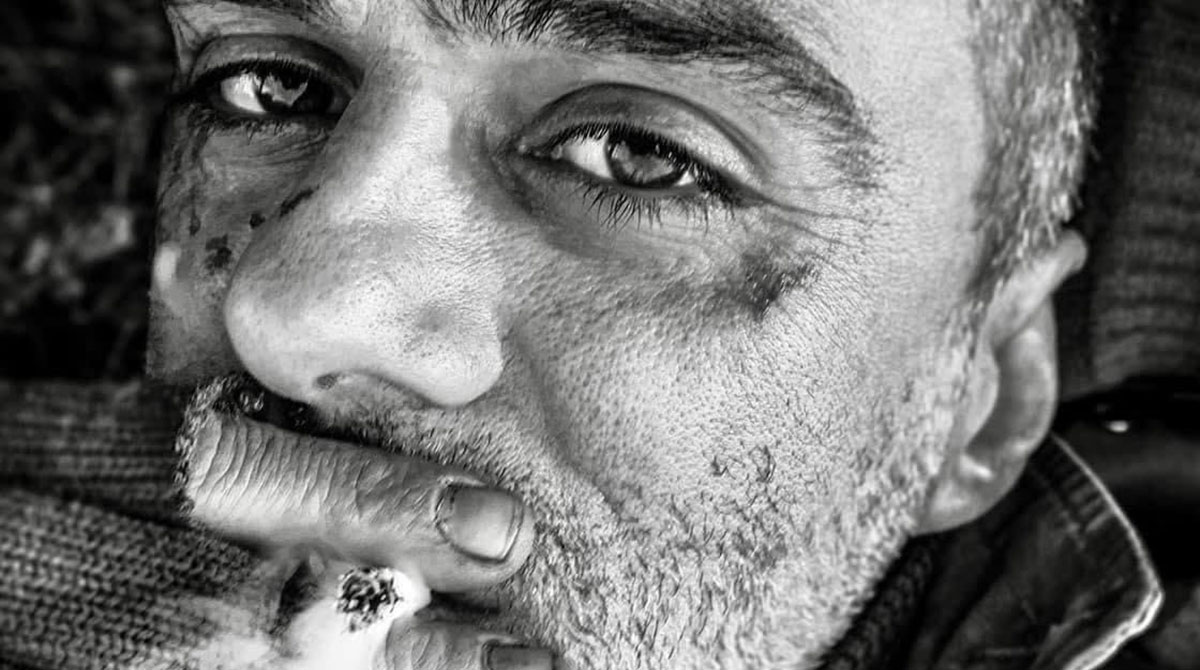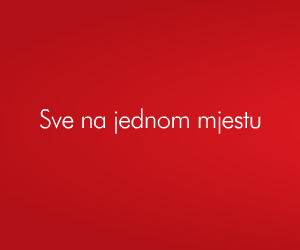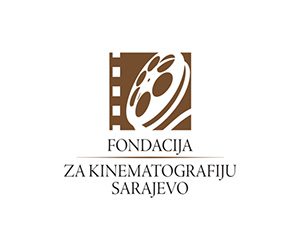
08/10/2024 Mediterranean film festival
There is insufficient support for artists, people are leaving and we are losing creative people, potential Oscar winners
There is no doubt, and there has never been any doubt. Acting was always IT for the actor Ivo Krešić from Mostar. This turns out to be the right choice, if judged by the reviews for his role of Ilija in the film „The Wrath of God“, directed by Kristijan Milić.
Acting is the most beautiful profession for me. I knew that I wanted to be an actor because this is the way in which I express myself most naturally. This is me. Acting is a job in which you can do things that are not possible in any other job. Imagine someone crying or screaming when working in some company. Acting is like a therapy where the actor is also a therapist and a patient. And this is a huge responsibility. Acting has always been a call, something that has drawn me because it enables me to explore various aspects of human experience, and with that I position myself in the coordinate system of life.
Professionally, this has been a very good year for you. Your role in the film “The Wrath of God” turned out to be the right choice, which was also confirmed by the critics. Are you satisfied with the work done, now with a distance?
Yes, this was a challenging but filled year. “The Wrath of God” was a real test, both emotionally and physically for me as an actor. Ilija is a multilayered, deep and well written character. When Kris invited me to play the lead role I felt that this is was a character I wanted to bring to life on the screen. Such projects are important for me because they make me explore deeper layers of myself and step outside my comfort zone. Positive critics are just an additional confirmation that this work is recognised. What fills me the most is the personal growth I experienced through this role, because every such challenge shapes the actor and the person you become.
This is not your first cooperation with the director Kristijan Milić and the scriptwriter Josip Mlakić. Can we say that characters like Ilija, and war stories, for which both Milić and Mlakić are both known, are “your thing”?
Cooperating with Kristijan and Josip is always a privilege. From the atmosphere on the set to the freedom that Milić as a director gives to actors. With him, you really feel that you are creating and building a character. Mlakić's story in itself carries enormous weight and complexity, and characters like Ilija are challenging because they carry internal conflicts and traumas that are not easy to portray, and for some people it is not easy to even recognize it. I am attracted to such characters because they hold the unsaid in them, they are multilayered, motivated and different from other people. “The Wrath of God” as a film brings something new, but at the same time something universal so I feel that I was a part of something that is not subject to trends but has a longer life.
Miljenko Jergović also had great words about the way you played this role, pointing out that this is the peak of your creativity and that you are the first post-partisan war hero of Croatian cinema. How do you comment on that?
Such a comment from Mr. Jergović touches you, of course. However, I don’t like to see things as “peaks”. I think he said something like an actor at the peak of his creativity in terms of age, maturity and work - I doubt that he really thought that this film was my peak. Anyway, these are nice words. And I believe that I can do more and better. Every role brings its own challenge, and I always think the best is yet to come. I am happy that my work on this character was acknowledged, but in the world of acting there is no standing still - every new project brings an opportunity for growth, and that is what drives me the most.
In your opinion, what are the biggest challenges the acting profession is currently facing in our country?
It is always a challenge to make a film, especially a good film. The audience doesn’t see what happens in the process of shooting a film, and of course, rightfully so, expects a good, great film for the money they pay for the cinema ticket or for paying some of the platforms through which they watch films and series and even theatre plays. I wouldn't know how to give a broad answer, believe me, but some of the problems are the increasingly fast way of life, consumption of art, even films, series, plays. Also, lately we have been reading about moral crises more and more often, there are many things as in any other profession. It seems to me that the most difficult thing is to remain human, and for roles, that’s the easy part. But despite all the challenges, I believe that creative people always find a way to create something valuable and that the audience recognise it.
What made you decide on this profession, were there any second thoughts, or you knew from the beginning that this was it?
There is no doubt, and there has never been any doubt. Acting is the most beautiful profession for me. I knew that I wanted to be an actor because this is the way in which I express myself most naturally. This is me. Acting is a job in which you can do things that are not possible in any other job. Imagine someone crying or screaming when working in some company. Acting is like a therapy where the actor is a therapist and a patient at the same time. And this is a huge responsibility. Acting has always been a call, something that has drawn me because it enables me to explore various aspects of human experience, and with that I position myself in the coordinate system of life.
In general, how would you evaluate the position of culture in our country, but also in the region, considering that when it comes to culture, borders, as a rule, should not even exist? Actually, do they exist?
There isn’t enough support to artists on all levels. This is where a kind of natural selection is created because there are too few resources for culture. Something needs to be changed here. It is very difficult for young directors to get funding for their first film, and for young actors to find employment. People are leaving. They turn to other occupations, more profitable. But we are losing creative people, potential Oscar winners and great actors. The system needs to be improved, of course, but don't ask me how. If I knew I would say how. In one sentence, more investment must be made in culture at all levels. Borders. Borders in culture are, unfortunately, often artificially created. Although creativity is without limits, we often face financial and political constraints. There are many talented people in our region, but lack of resources and support makes their work harder. Still, I believe that art always finds its way and that creativity knows no boundaries. Culture should connect people, not divide them.
What are the borderlines for you personally, what would you not cross?
For me, borders represent multiple layers. First of all, there are the borders of personal integrity - I would not accept projects that compromise my beliefs or values. I believe that it is important to stay true to yourself and what you want to convey through your roles. On the other hand, there are also professional boundaries - I like challenges, but I look for projects that inspire me and make me grow. I wouldn’t accept a role just for popularity or money, there has to be some deeper sense. And finally, the borders in terms of acting challenges – I would not engage in projects that do not allow creative freedom or that put me in a "mould". Acting is a process of constant research and growth, and it is important for me that every new project brings something new and challenging.
How do you choose roles? What was the most challenging until now and why?
I choose the roles in film according to how much they challenge me and how much I feel that I can bring to them, if I can tell the story of a character or not. The most important thing for me is that there is an emotional truth in the character I play. The most challenging role so far? I would say that it was Ilija, because he demanded everything from me, physically and emotionally. You had to get deep into his mind and understand the entire trauma that he carried. When I was preparing for the role, I slept for several days at night fully dressed in a borrowed uniform and boots, in order to avoid comfort and a "break" with the character. It wasn't comfortable, but it was worth it because it gave credibility on set. There were times when I thought I wouldn't be able to keep up the intensity, but that's what I love most about acting - the constant challenge and pushing boundaries, exploring new dimensions of myself.
Who are your role models in the acting world and how have they influenced your work?
I have been watching films a lot ever since I was a child. I draw inspiration from famous and lesser known actors and actresses. But honestly speaking, the biggest inspiration is in the people around you, honest people, who allow themselves the luxury of being the way they are. I enjoy watching Daniel Day-Lewis, Javier Bardem... Their ability to transform is what I aspire to. Daniel Day-Lewis fascinates me with his total dedication to the roles - he completely immerses himself in the character. Javier Bardem has that raw energy that overwhelms you in every scene. It is important to get deeply into the character, not only from the outside, but also from the inside, convince yourself of what you should be, and then the audience will see it.
You are an actor at the Croatian National Theatre Mostar, how do you balance the theatre and film engagement? Is there any difference in the approach to these two types of performances?
Theatre is a special world – you feel the energy of the audience right away, this is live interaction. In the theatre you have to be present at every moment, there are no repetitions or corrections. It is happening here and now. And when it's over, an empty scene leaves an impression on the hearts and minds of the audience. Film, on the other hand, allows for more subtle development of the character, because you have more time to repeat each scene and details. Balancing between these two worlds is a challenge and also a blessing – each medium has its own beauty. I love these differences, because they allow me to develop different aspects of my acting expression. I also like to perform for children; it is a completely different world from the world of adults. All of this gives the actor a certain width.
You are a member of the jury at this year's Mediterranean Film Festival in Široki Brijeg. You have already had the opportunity to watch some of the films, how do you rate this year's selection?
In one word – excellent. I have been following the Mediterranean Film Festival since its beginnings and I am glad that I can participate as a member of the jury and evaluate excellent films of local and international productions. This year we have very high-quality films, with strong stories that are deeply rooted in reality, but which also carry universal themes. It will be extremely difficult to give preference to someone because the nuances will decide the winner. I can already say that with certainty. I think that the selection of films this year is extremely strong and important, the topics are relevant, some even shocking, but the audience will also be able to see great films.
In general, what is your attitude regarding such an event? What is its greatest significance?
Festivals like this are extremely important because they provide an opportunity for authors, especially young ones, to show their work and encourage creative dialogue. Another thing is the audience that has the opportunity to see the new creations of the world's documentary talents, and that is truly a privilege. I think that their greatest importance lies precisely in connecting the audience with the authors, as well as encouraging young talents to express themselves through film. The Mediterranean Film Festival is particularly important because it focuses on the stories from our region, but also brings international perspectives, which enables the exchange of ideas and styles. It is an opportunity for everyone to expand their horizons.
What are your next plans, are you already working on a new project?
The next film project will be completely different from war characters or war related themes. I don't want to be recognised for just one type of role because that doesn't lead to growth. The challenge is in taking on different roles and exploring different human experiences.


